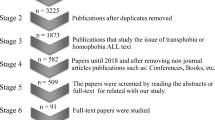Abstract
Introduction
Challenging the binary construction of prostitution as work or violence, in this article we adopt a perspective to the under-researched phenomenon that is attentive to the agency of sex workers. The Introduction theorizes sex work as a continuum of professional and organizational practices, and discusses prostitution frameworks and markets in two post-socialist EU member states, Slovenia and Croatia. The main aim was to explore how organizational patterns of sex work develop in the two countries and what their specific features and varieties are according to the different policy systems.
Methods
Empirical analysis that is based on fifteen qualitative interviews (conducted in 2017) with sex workers in Slovenia and Croatia.
Results
Analysis show that decriminalization policy context is more conducive to professionalization of sex work which can positively impact security and job satisfaction, while the criminalization framework facilitates violence and suppresses the empowerment of sex workers.
Conclusion
It is argued that “governing through crime” that still persists, especially in Croatia, needs to develop alternatives such as adopting the principle of “collaborative governance” where policy decisions are informed by sex workers.
Social-policy implications
Analysis show that decriminalization has enabled teamwork when sex workers interconnect as a business strategy, while the criminalization framework functions to limit the agency of sex workers. While stigmatization and marginalization of sex workers largely persists in both countries, the decriminalization in Slovenia has enabled teamwork when sex workers interconnect as a business strategy.
Similar content being viewed by others
Notes
We acknowledge the importance of the terms sex work and sex worker used by sex workers’ rights activists to resist the dominant representation of prostitution as all violence and the persons involved in prostitution as victims. However, we use the term prostitution to signify the sector of the industry/type of work we are analysing.
This study is part of a larger project Comparing Croatian and Slovenian Prostituion Regimes: Surpassing Exclusions, Securing Human Rights, financed by the ISRF. See Radačić and Pajnik (2017).
References
Abel, G. (2019). The problem with sex work policies. Archives of Sexual Behavior, 48, 1925–1929.
Agustín, L. M. (2005). The cultural study of commercial sex. Sexualities, 8(5), 618–631.
Altman, D. (1999). Foreword. In P. Aggleton (Ed.), Men who sell sex: International perspectives on male prostitution and HIV/AIDS (pp. 13–19). London: ULC Press.
Amnesty International. (2016). Policy on state obligations to respect, protect and fulfil the human rights of sex workers. POL 30/4062/2016. Available from: https://www.amnesty.org/download/Documents/POL3040622016ENGLISH.PDF (accessed 15 July 2019).
Benoit, C., Smith, M., Jansson, M., Healey, P., & Magnuson, D. (2019). The prostitution problem: claims, evidence, and policy outcomes. Archives of Sexual Behaviour, 48, 1905–1923.
Boyatzis, R. E. (1998). Transforming qualitative information: Thematic analysis and code development. London: Sage.
Brewis, J., & Linstead, S. (2000a). Sex, work and sex work: Eroticizing organization. London: Routledge.
Brewis, J., & Linstead, S. (2000b). “The worst thing is the screwing”: Context and career in sex work. Gender, Work and Organization, 7(3), 168–180.
Brewis, J., & Linstead, S. (2002). Managing the sex industry. Culture and Organization, 8(4), 307–326.
Chapkis, W. (1996). Live sex acts: Women performing erotic labour. London: Routledge.
Fodor, E. (2002). Gender and the experience of poverty in Eastern Europe and Russia after 1989. Communist and Post-Communist Studies, 35(4), 369–382.
Fonow, M. M., & Cook, J. A. (2005). Feminist methodology: New applications in the academy and public policy. Signs: Journal of Women and Culture, 30(4), 295–301.
Goffman, E. (1963). Stigma: Notes on the management of spoiled identity. New York: Simon and Schuster.
Hochschild, A. R. (1983). The managed heart: Commercialization of human feeling. Berkley, CA: University of California Press.
Kerovec, N. (2003). (Ne)jednakost žena na tržištu rada. ((In)equality of women in the labour market). Revija za socijalnu politiku, 10(3), 263–282.
Kligman, G., & Limoncelli, S. (2005). Trafficking women after socialism: To, through and from Eastern Europe. Social Politics: International Studies in Gender, State and Society, 12(1), 118–140.
Koken, J. A. (2012). Independent female escort’s strategies for coping with sex work related stigma. Sexuality & Culture, 16(3), 209–229.
Kuhar, R., & Pajnik, M. (2019). Negotiating professional identities: Male sex workers in Slovenia and the impact of online technologies. Sexuality Research & Social Policy, 16(2), 227–238.
Leinert-Novosel, S. (2000). Democratic transition and position of women in Croatia. In J. A. Petrović (Ed.), Diskriminacija žena u Hrvatskoj (Discrimination of women in Croatia). ICFTU CEE Women’s Network.
Leskošek, V., & Dragoš, S. (2014). Social inequality and poverty in Slovenia – Policies and consequences. Družboslovne razprave, 30(76), 39–53.
Macioti P.G., & Garofalo Geymonat, G. (Eds). (2016). Sex workers speak. Who listens? Available from: opendemocracy.net/beyondslavery (accessed 1 December 2019).
Maher, J., Pickering, S., & Gerard, A. (2012). Privileging work not sex: Flexibility and employment in the sexual service industry. The Sociological Review, 60(4), 654–675.
Manning, E., & Bungay, V. (2017). “Business before pleasure”: The golden rule of sex work, payment schedules and gendered experiences of violence. Culture, Health & Sexuality, 19(3), 338–351.
Marx, K. (1844/1959). Economic and philosophic manuscript of 1844. Moscow: Progress Publishers.
O’Neill, M. (2001). Prostitution and feminism: Towards a politics of feeling. Cambridge: Polity Press.
Pajnik, M. (2008). Prostitution and human trafficking: Gender, labour and migration aspects. Ljubljana: The Peace Institute.
Pajnik, M. (2017). Prostitution policy and practice: Peculiarities of decriminalisation. In I. Radačić & M. Pajnik (Eds.), Prostitution in Croatia and Slovenia: Sex workers’ experiences (pp. 111–124). Zagreb: Institute of Social Sciences Ivo Pilar; Ljubljana: The Peace Institute.
Radačić, I. (2017a). Croatia. In S. Okland Jahnse & H. Wagenaar (Eds.), Assessing prostitution policies in Europe (pp. 217–228). London: Routledge.
Radačić, I. (2017b). Prostitution policy and practice: Criminalisation framework. In I. Radačić & M. Pajnik (Eds.), Prostitution in Croatia and Slovenia: Sex workers’ experiences (pp. 27–37). Zagreb: Institute of Social Sciences Ivo Pilar; Ljubljana: The Peace Institute.
Radačić, I., & Pajnik, M. (Eds.). (2017). Prostitution in Croatia and Slovenia: Sex workers’ experiences. Zagreb: Institute of Social Sciences Ivo Pilar; Ljubljana: The Peace Institute.
Radačić, I. & Šikić Mićanović, L. (2017). In I. Radačić, M. Pajnik (Eds), Prostitution in Croatia and Slovenia: Sex workers’ experiences (pp. 95–107). Zagreb: Institute of Social Sciences Ivo Pilar; Ljubljana: The Peace Institute.
Rhodes, T., Simić, M., Baroš, S., Platt, L., & Žikić, B. (2008). Police violence and sexual risk among female and transvestite sex workers in Serbia: A qualitative study. BMJ, 337, 1–6 Available from: https://www.bmj.com/content/bmj/337/bmj.a811.full.pdf (accessed 13 Oct 2019).
Sanders, T., O’Neill, M., & Pitcher, J. (2017). Prostitution: Sex work, policy & politics. London: Sage.
Scambler, G. (2007). Sex-work stigma: Opportunist migrants in London. Sociology, 41(6), 1079–1096.
Scoular, J. (2010). What’s law got to do with it? How and why law matters in the regulation of sex work. Journal of Law and Society, 1(37), 12–39.
Simon, J. (2007). Governing through crime: How the war on crime transformed American democracy and created a culture of fear. New York: Oxford University Press.
Štulhofer, A., Baćak, V., Drglin, T., Puljiz, M., & Miklin, M. (2009). Female sex workers and HIV risks in Croatia. AIDS Care, 21(11), 1439–1446.
Štulhofer, A., Sinković, M., Božić, J., & Baćak, V. (2016). Victimization and HIV risks among Croatian female sex workers: Exploring the mediation role of depressiveness and moderation role of social support. Violence Aainst Women, 23(1), 67–88.
SWAN, Sex Workers’ Rights Advocacy Network. (2015). Failures of justice. State and non-state violence against sex workers and the search for safety and redress. Budapest: SWAN.
Wagenaar, H. (2017). Why prostitution policy (usually) fails and what to do about it? Social Sciences, 6(2), 43.
Wagenaar, H., & Altink, S. (2012). Prostitution as morality politics or why it is exceedingly difficult to design and sustain effective prostitution policy. Sexuality Research and Social Policy, 9(3), 279–292.
West, J., & Austrin, T. (2002). From work as sex to sex as work: Networks, ‘others’ and occupations in the analysis of work. Gender, Work and Organization, 9(5), 482–503.
Wong, W. C., Holroyd, E., & Bingham, A. (2011). Stigma and sex work from the perspective of female sex workers in Hong Kong. Sociology of Health and Illness, 3(1), 50–65.
Acknowledgements
We want to acknowledge the work of Lynnette Šikić Mićanović and Emanuela Fabijan who were with us the co-authors of the chapters Sex Workers and Sex Work in Prostitution in Croatia and Slovenia: Sex Workers’ Experiences. Zagreb: Institute of Social Sciences; Ljubljana: The Peace Studies (2017).
Funding
This research is part of the project financed by the Independent Social Research Foundation, Comparing Croatian and Slovenian Prostitution Regimes: Surpassing Exclusions and Securing Human Rights, ID 733, small group award. The finalisation of the Slovenian part of the study was conducted as part of the research programme of the Peace Institute Equality and Human Rights in Times of Global Governance, P5-0413, financed by the Slovenian Research Agency, 2020–2023.
Author information
Authors and Affiliations
Corresponding author
Additional information
Publisher’s Note
Springer Nature remains neutral with regard to jurisdictional claims in published maps and institutional affiliations.
Rights and permissions
About this article
Cite this article
Pajnik, M., Radačić, I. Organisational Patterns of Sex Work and the Effects of the Policy Framework. Sex Res Soc Policy 18, 575–587 (2021). https://doi.org/10.1007/s13178-020-00482-6
Published:
Issue Date:
DOI: https://doi.org/10.1007/s13178-020-00482-6




